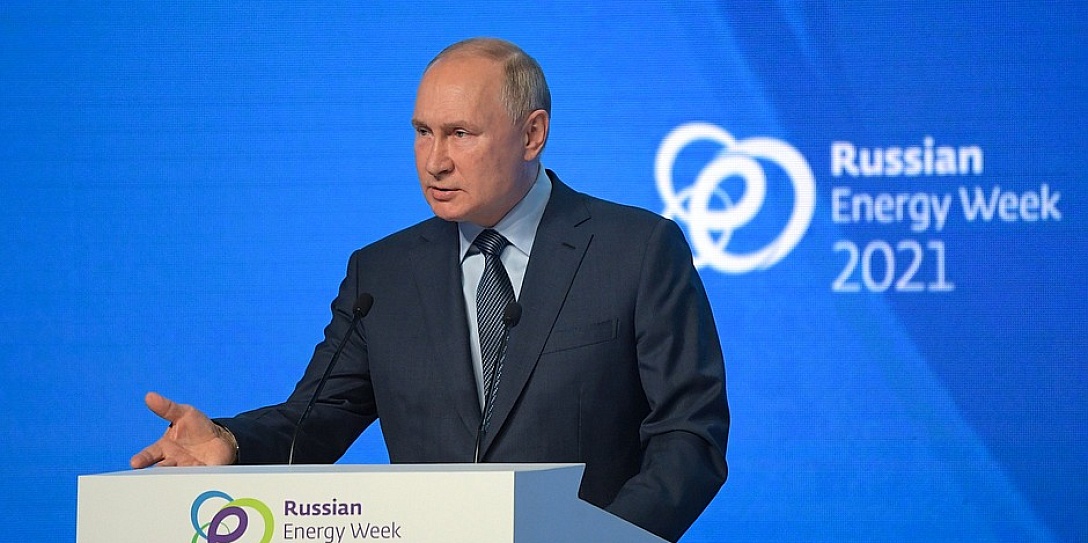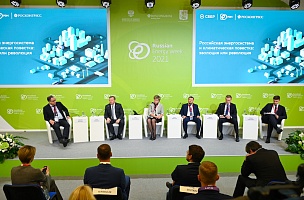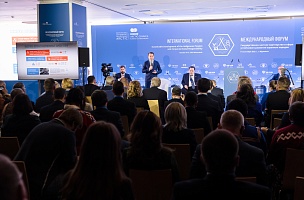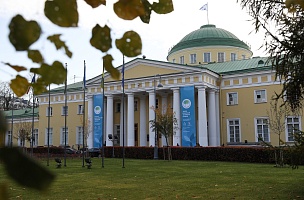Vladimir
Putin took part in the plenary session of the Russian Energy Week International
Forum. The panel discussion topic is Global Energy: Transformation for
Development
Speech at the plenary session of the Russian Energy Week
President of Russia Vladimir Putin: Friends,
Ladies and gentlemen,
I
would like to welcome all participants and guests of the Russian Energy Week.
Moscow is again hosting heads of the leading energy companies and corporations,
authoritative experts and specialists, in order for them to jointly discuss the
current state of and prospects for the global energy sector and its most
important trends, and, of course, to suggest mechanisms for the long-term
stabilisation of the energy market, which is of particular importance amid the
current challenges that our moderator has just mentioned.
The
energy sector has felt the full impact of the crisis caused by the COVID-19
pandemic, when forced restrictions, business slowdown, production stoppages and
transport disruptions all over the world dramatically reduced the demand for
energy resources. The people present in this room know this quite well because
these problems have affected their companies.
Last
year’s results show that global primary energy consumption declined by 4.7
percent, which was the heaviest shock for the sector over the past 70 years.
Prices have been adjusted to the falling demand. Last year, for example, the
price of natural gas in Europe dropped by 60 percent to $113 per thousand cubic
metres against $159 in 2019 and $282 in 2018.
The
situation in the oil sector was altogether unique. None of you or us could even
believe it. Nobody could even imagine that last spring oil would record
negative prices for the first time in history. It became more expensive to
store oil than to purchase it. This situation is simply unique.
The
OPEC+ agreements played a key role in stabilising the oil market at that time.
The OPEC and non-OPEC countries managed to develop efficient cooperation,
ensure the stability of the oil sector during the pandemic and, most
importantly, create conditions for investment activity If investment in new
deposits and future oil production had been suspended, the market would have
quickly faced a huge, critical shortage. We are seeing some of these things
today.
Now
at the stage of global economic recovery and growing oil demand, our countries
are also stabilising the market and its price quotes. They are promptly
increasing oil production and shipping.
Russia
is a responsible OPEC+ member. We assume the agreement will remain valid until
the end of next year, 2022.
At
the same time, the current results show that cooperation between our countries
has every opportunity for further expansion. It may embrace additional areas,
including the development of new eco-friendly technology for producing and
processing hydrocarbons, and an exchange of the best practices for measuring
and reducing the carbon footprint.
As
distinct from oil, the situation in the gas market, primarily in Europe, does
not yet look balanced and predictable. The main reason for this is that not
everything in this market depends on producers: gas consumers are playing an
equal and even bigger role.
I
am going to say a few things that may sound like obvious and commonplace truths
in this professional audience, but various persons in charge have lately chosen
to forget about them or keep silent about them, replacing an analysis of the
situation with empty political slogans.
Here
is what I am talking about. Over the past 10 years, the share of renewable
energy sources in the European energy balance has skyrocketed, which, on the
face of it, appears to be a good thing – and they are now playing a significant
and noticeable part. What can you say? It is a good thing any way you look at
it.
However,
this sector is notorious for erratic power generation. It requires large
reserve capacities. In the event of major generation failures, primarily due to
bad weather, this reserve is simply not large enough to cover the demand.
This
is exactly what happened this year, when, due to a decrease in wind farm
generation, there was a shortage of electricity on the European market. Prices
soared, which triggered a spike in natural gas prices on the spot market.
Importantly,
gas consumption is seasonal. Its reserves are traditionally replenished in the
summer to meet the winter demand. However, this year, even after a cold winter
in Europe, many countries chose not to do so, relying on spot gas supplies and
the “invisible hand” of the market, but a spike in demand has sent prices even
higher.
To
reiterate, the rise in natural gas prices in Europe stemmed from shortages of
electricity, not the other way around. There is no need to lay the blame on
other people, which is what some of our partners are trying to do.
Occasionally, you get stunned by what is being said on this account, as if
these people do not know the numbers – I will say more about this later – as if
they do not see the reality and are just covering up their own mistakes. Systemic
flaws have been gradually introduced in European energy over the past decade,
which led to a major market crisis in Europe.
As
a reminder, when nuclear and natural gas-based generation were the leading
energy sources, there were no such crises, and there were no grounds for them.
Thankfully,
problems of this kind have no place in Russia. A long-term approach to the fuel
and energy complex allows us to set Europe’s lowest residential and industrial
electricity rates. To put that into perspective, the average price of
electricity in Russia is about 20 euros per megawatt-hour; in Lithuania it is
256 euros, 300 euros in Germany and France, and 320 euros in the UK.
The
growth of rates in our country is limited and is strictly regulated, which is
not the case in European countries, where, due to an increase in the cost of
power generation, utilities bills have been climbing almost every month
recently. I have these numbers on my fact sheet, but I am not going to bore you
with the details now.
I
would like to say a few more words about the gas market situation. You often
hear that high listings are good for raw materials producers allowing them to
see super-profits without making any visible effort.
However,
those defending this position do not understand what they are talking about;
they prefer not to look ahead, and are slow to take into consideration the
long-term implications. But these implications are clear, including for the
industry: the dramatic, repeated surge in energy prices influences business,
the economy, and the utilities sector during periods of drastically increased
costs; many businesses are forced to cut energy consumption and reduce
production volumes. This means that high prices can ultimately have negative
consequences for everyone, including producers. Russian producers, including
those in this room, are well aware of this.
Stability
and predictability are important in any market. Russia fulfils its contractual
obligations to our partners in full, including its partners in Europe, ensuring
guaranteed, uninterrupted gas supplies in this direction. We are seeing
conditions that will result in record high volumes of gas distribution to the
global market by year end. Moreover, we are always willing to meet our partners
halfway and are ready to discuss additional actions.
We consistently work to strengthen the energy security of the entire European continent. Major infrastructural projects – Turk Stream, Balkan Stream, Nord Stream 1 and Nord Stream 2 – are being implemented jointly with European companies, our partners and friends. Their task is to ensure, for years ahead, the stability and predictability of gas availability in the amounts needed by the European countries. I would like to add that the implementation of these projects is leading to a considerable – by several orders of magnitude – reduction in greenhouse gas emission. Just for your information: the carbon intensity of Russian natural gas distribution along the Nord Stream 1 pipeline is 66.7 percent lower than that of US LNG. I am saying this just to compare.
To be continued.
Source:
kremlin.ru






